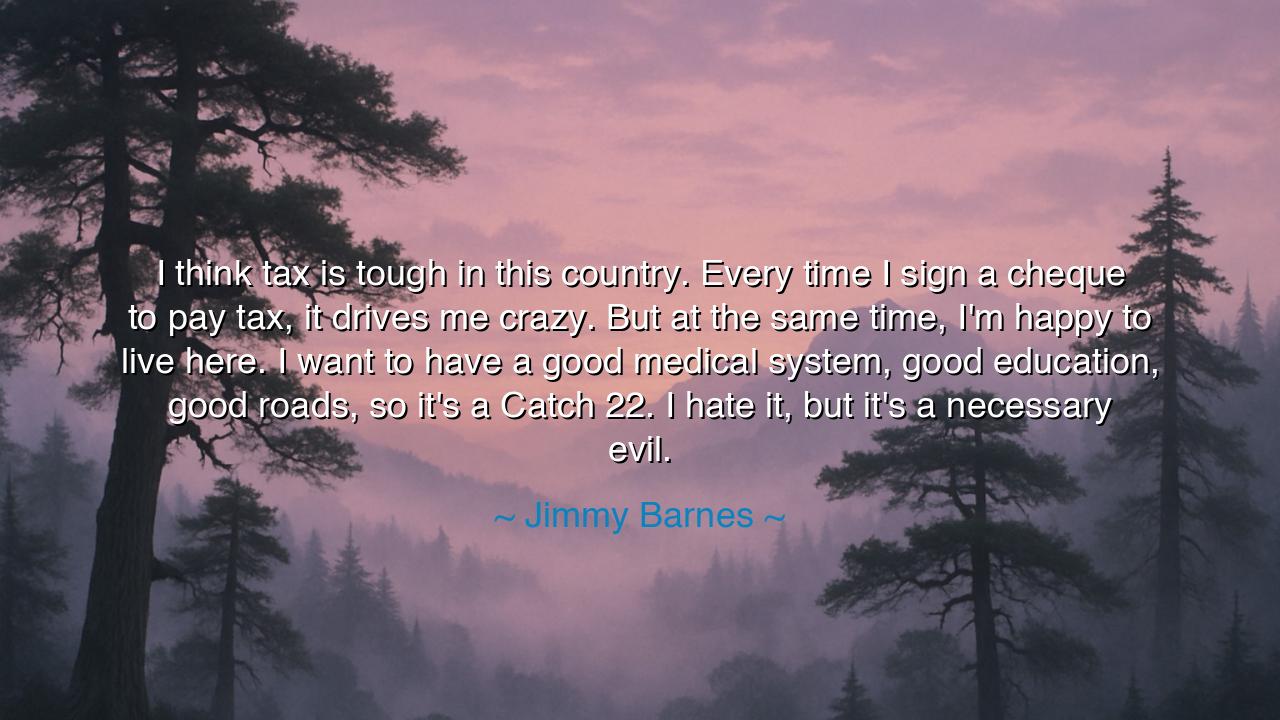
I think tax is tough in this country. Every time I sign a cheque
I think tax is tough in this country. Every time I sign a cheque to pay tax, it drives me crazy. But at the same time, I'm happy to live here. I want to have a good medical system, good education, good roads, so it's a Catch 22. I hate it, but it's a necessary evil.






“I think tax is tough in this country. Every time I sign a cheque to pay tax, it drives me crazy. But at the same time, I’m happy to live here. I want to have a good medical system, good education, good roads, so it’s a Catch-22. I hate it, but it’s a necessary evil.”
Thus spoke Jimmy Barnes, the fiery soul of rock and an honest son of the working class, expressing with rare candor the eternal tension between burden and belonging, between the sting of sacrifice and the sweetness of shared prosperity. His words may sound simple, but within them beats the ancient truth that freedom and comfort are never free — that the price of a stable society is the contribution of its citizens. In his voice resounds the frustration of the individual and the gratitude of the patriot, woven together in a confession that is as timeless as civilization itself.
The origin of this quote arises from Barnes’ life as both a performer and a man of the people. Born in poverty and raised amidst struggle, he knows firsthand the value of systems that care for those who cannot care for themselves — the medical system, the education system, the roads and infrastructure that hold a society together. Yet, as a man who has labored, earned, and succeeded, he also knows the pain of watching his hard-won earnings disappear into the vast machinery of government. Thus, he names the paradox — the “Catch-22” — that every responsible citizen must face: the heart desires justice and order, but the hand trembles when paying for it.
In these words, Barnes gives voice to a universal human experience — the struggle between self-interest and the common good. It is a dilemma as old as the dawn of kingdoms. The farmer who pays tribute to the ruler to protect his fields, the merchant who endures tariffs to ensure safe passage, the worker who contributes to a system that builds schools for children he will never meet — all partake in this eternal tension. The individual groans, yet the nation thrives; and thus, the wise have always taught that sacrifice is the foundation of civilization.
Consider the ancient story of Solon of Athens, the lawgiver who sought to reform his city’s inequality. When he proposed that the rich contribute more to support the poor, his peers scorned him; yet Solon reminded them that without unity and shared duty, their wealth would crumble with the city itself. He understood what Barnes voices centuries later — that resentment toward the burden must coexist with recognition of its necessity. For a society that consumes without contributing soon devours itself. To hate taxation but accept its purpose is to live in the realm of maturity, where one learns that discomfort is sometimes the guardian of peace.
Barnes’ mention of a good medical system and good education transforms his complaint into a meditation on gratitude. Though he laments the drain of his earnings, he recognizes the gifts that flow in return: hospitals that heal, schools that enlighten, roads that connect. These are not luxuries, but the arteries of a living civilization. Without them, the nation decays into chaos and isolation. Thus, his “necessary evil” is not evil in the moral sense, but in the emotional one — a reminder that the things that sustain life often demand from us more than we wish to give. It is the same principle by which the farmer sweats before harvest, or the soldier endures hardship for peace.
This truth carries a lesson for all who live in comfort: that contribution, though bitter to taste, is sacred in its outcome. The taxes we pay, the duties we uphold, the efforts we make for the good of all — these are the threads that bind a nation’s heart together. To resist them without understanding is folly; to bear them with awareness is wisdom. As the ancients taught, “He who eats the fruit must tend the tree.” Barnes’ words, raw and human, remind us that citizenship is not a transaction but a covenant — an agreement to sustain what sustains us.
So, my listener, take this teaching to heart: do not despise the burden that preserves the good. When you give — whether through labor, through service, or through the taxes that build the common good — give with awareness. Know that your discomfort feeds a greater comfort, your sacrifice builds the future, and your participation keeps the light of civilization burning. The wise do not seek to escape the duties of the community; they embrace them, knowing that freedom without responsibility is but an illusion.
Thus, in the voice of Jimmy Barnes, we hear the timeless music of human struggle — the growl of the laborer, the sigh of the taxpayer, the gratitude of the citizen. He calls us to see beyond the irritation of the moment into the architecture of the whole — to understand that what feels like loss may in truth be contribution, and what we call a “necessary evil” may be, in the end, the quiet work of good.






AAdministratorAdministrator
Welcome, honored guests. Please leave a comment, we will respond soon